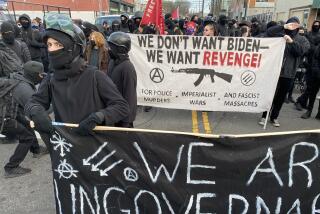U.S. Raids Iraq’s Police Academy
- Share via
BAGHDAD — U.S. military forces raided Iraq’s national police academy Saturday, arresting the dean and 14 others as they conducted a meeting of Saddam Hussein’s now-outlawed Baath Party, the top American law enforcement official here said.
Former New York City Police Commissioner Bernard Kerik, who serves as the senior U.S. advisor to Iraq’s Interior Ministry, told reporters the raid followed a tip five days ago that some of same officers who ran the academy under Hussein were still convening every Saturday morning there.
Kerik said military police broke into the meeting shortly after 10 a.m. and led handcuffed participants away as other academy employees applauded.
“This sent a very strong signal to the Baath Party [that] if you are a member of the party, you will be removed,” Kerik said at the end of a week of anti-American violence that some U.S. authorities linked to holdout Baathists. “We’re not going to tolerate illegal activity.”
The police academy roundup occurred on a day of protest and confusion in central Baghdad as thousands of those employed at government ministries took to the streets in a series of ill-organized but peaceful demonstrations to demand their jobs back.
The Arab-language satellite television channel Al Jazeera reported that, elsewhere in the city, U.S. forces shot one person to death and wounded three others after a hand grenade was thrown at a group of soldiers. But American military officials in Baghdad said late Saturday that they were unaware of the incident.
Kerik described the police academy raid as evidence that U.S. occupation authorities are serious about clearing government institutions of those who served Hussein’s regime at the highest levels. The operation netted five police brigadier generals and three colonels in addition to the academy’s dean, Maj. Gen. Akram Abdul Razak.
The action came nearly six weeks after the U.S. declared the Baath Party dissolved. In mid-May, U.S. civil administrator L. Paul Bremer III signed an order banning senior party members from public-sector employment.
But the arrests Saturday underscored how difficult the process of ridding Iraqi society of once-powerful Baath Party functionaries is likely to be. Kerik indicated, for example, that those arrested had already passed through an initial screening process set up to identify former Baathists.
The fact that the group was able to meet regularly for nearly two months after the collapse of Hussein’s regime without much apparent effort to conceal their activities showed the weaknesses of this procedure.
“There is a vetting process, but it’s not foolproof,” Kerik acknowledged.
A senior official at the Pentagon-run Office of Reconstruction and Humanitarian Assistance, the agency administering Iraq, called Saturday’s raid “part of an ongoing process that is going to take some time.”
Through much of Saturday morning, groups of demonstrators clogged Baghdad’s streets and jostled one another trying to bring their concerns to the attention of occupation authorities.
On Firdos Square, near the Palestine Hotel where many foreign journalists stay, about 300 employees of the now-dissolved Information Ministry protested Bremer’s decision to shut down their ministry, putting more than 5,000 people out of work without a pension.
Abdul Wahab, 52, said he worked for the ministry nearly all his adult life as a government censor.
“Twenty years of work, and in the end, nothing? My God!” he exclaimed in English.
His colleague Yousef Mounir acknowledged that the ministry had provided propaganda for Hussein but argued that most of its employees were innocent people.
“Does it mean we should lose our jobs -- no salaries, no rights?” he said. “They made a big mistake.”
A third employee, Tawfiq Kawther, 56, said he had been in charge of publications for the blind. Kawther, who is sightless, had worked in the ministry for 36 years and was pessimistic about finding another job.
President Bush “promised us welfare and democracy,” he said. “Did he come to make us more miserable?”
As the Information Ministry workers chanted and listened to speeches, another group of about 100 people from the Education Ministry surged into the square, complaining that senior Baath Party officials had refused to leave their posts in the ministry despite the ban.
Many other government workers are upset by a lack of information about their fate.
Although ORHA announced the dissolution of the Information Ministry days ago, for those standing outside the gates of the Iraq Television and Radio building Saturday, it remained only a rumor.
“There’s no one to tell you the truth,” said Ruqaya Hassan, an Iraqi TV announcer. “We’ve heard rumors there are no jobs for us.”
More to Read
Sign up for Essential California
The most important California stories and recommendations in your inbox every morning.
You may occasionally receive promotional content from the Los Angeles Times.











